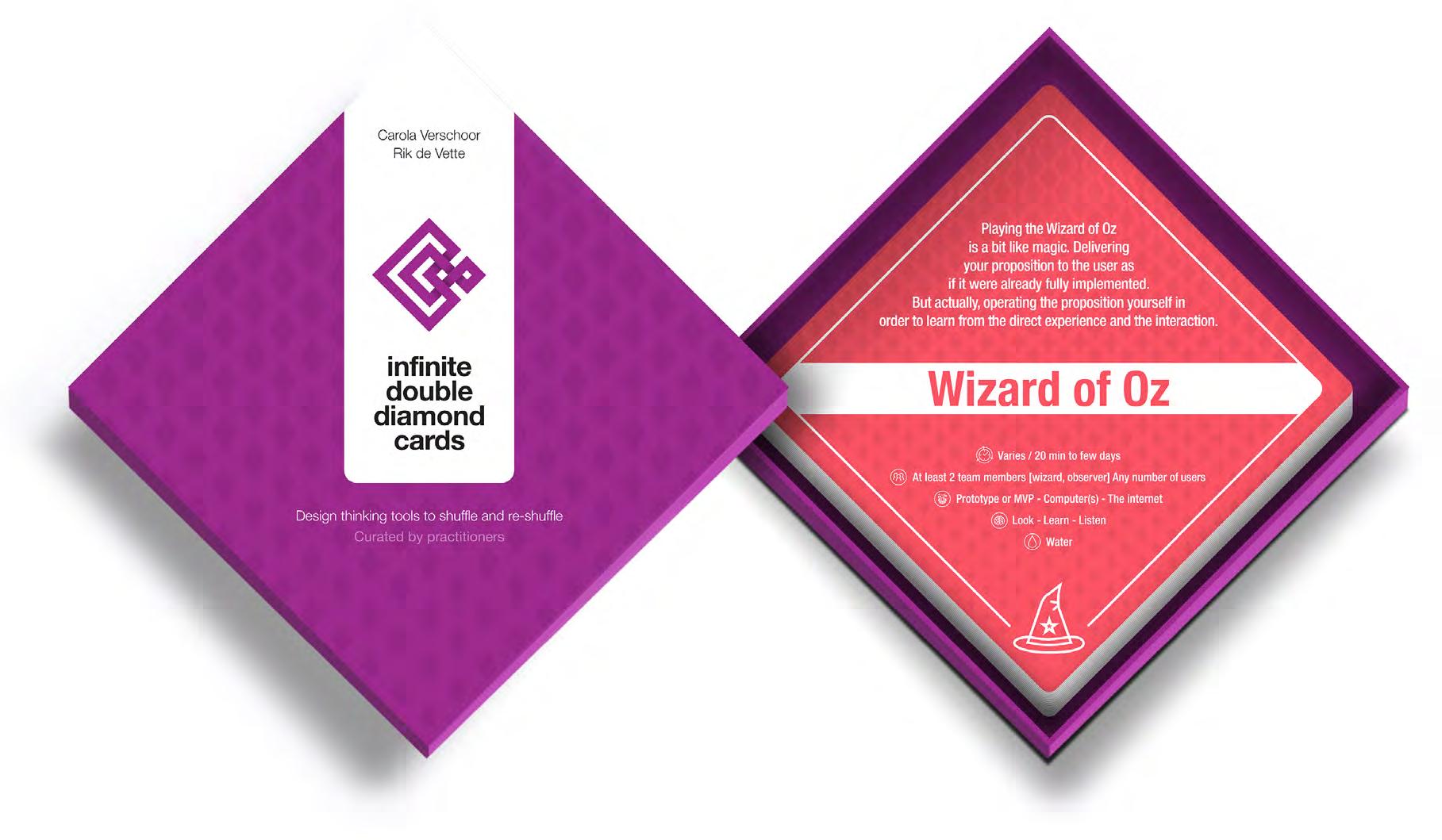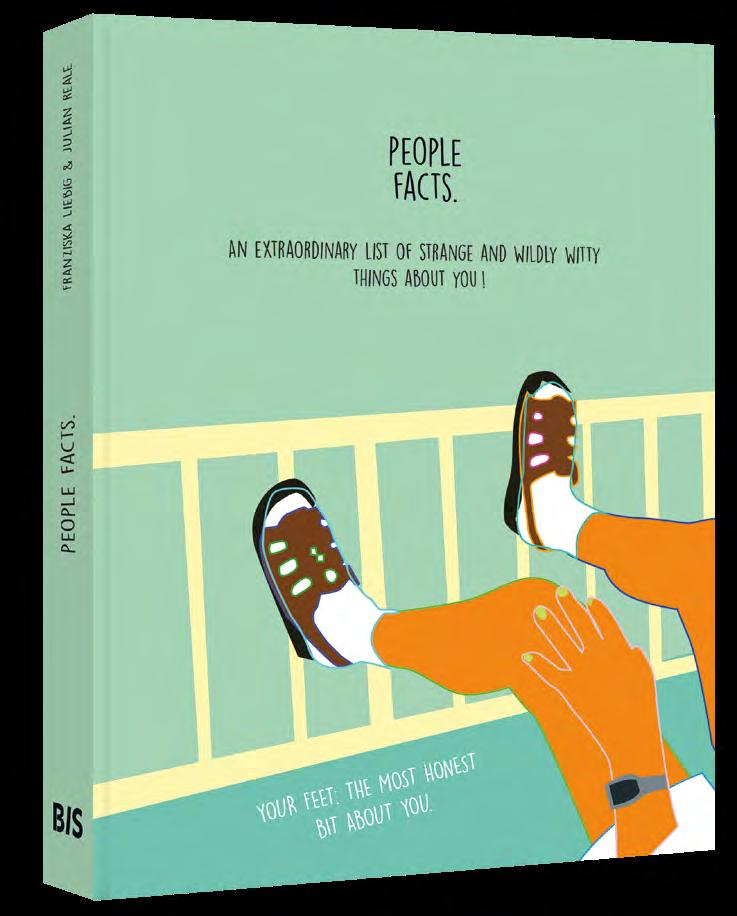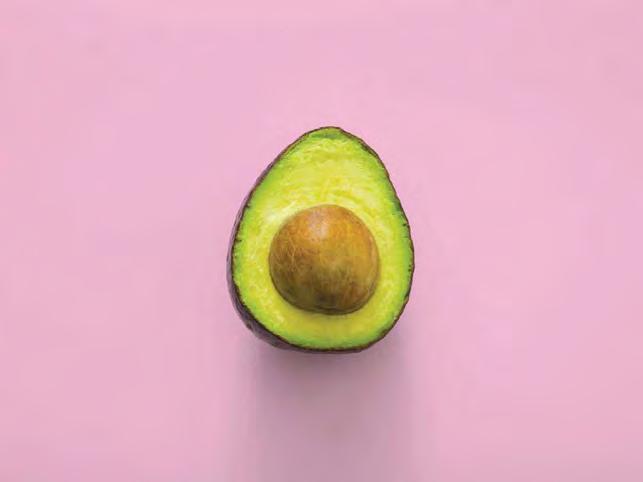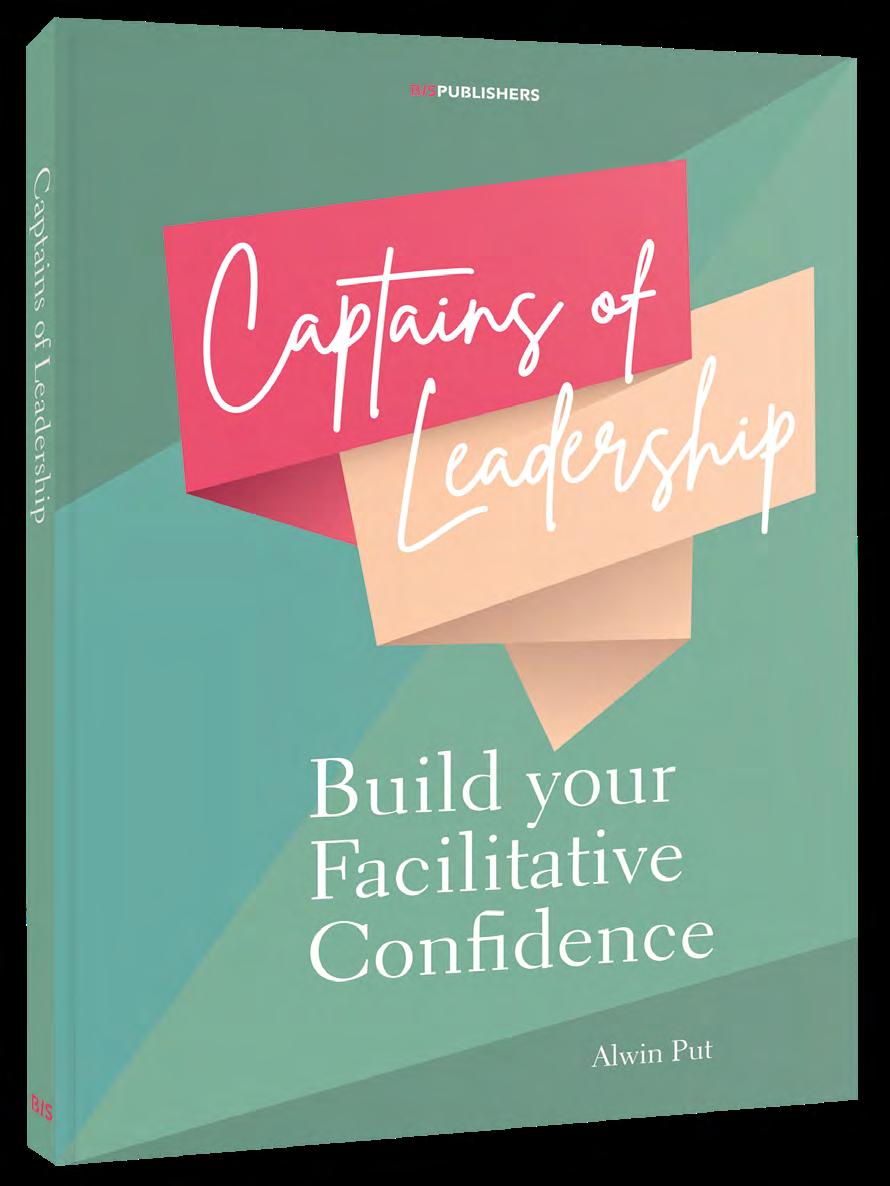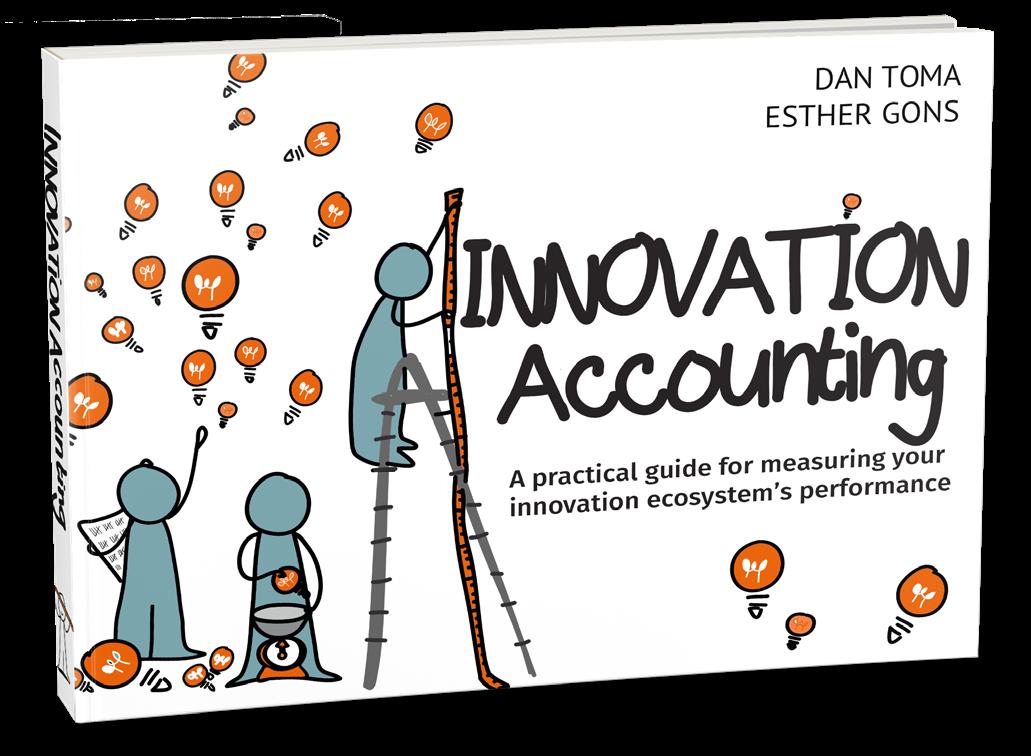RECENTLY PUBLISHED
Design Things That Make Sense Tech. Innovator’s Guide
This book is the first and complete guide to designing technology-based products and services. It answers questions like: Why do some products become a success while others fail? Why do some products create value while others destroy it? Why is there so much technology-push and so little thinking from the outside-in?
Info May 2021 Paperback with flaps 176 pages 17 x 17 cm ₤ 14.99 ISBN 9789063696146
Technology unlocks new capabilities that nobody asked for, but applied correctly can create value for users. This sounds easier than it is; designing successful tech products and services requires a unique approach. Through case studies, practical insights, examples, tips and tools, readers will learn how to adopt a user-centred mindset and apply technologies in a meaningful way.
NUMBER REFERENCE
The book contains over 50 design strategies to design strong benefits and minimise the resistance people might have against new technologies. It is for innovators who want to do better and design products and services that make sense.
CASE STUDY Nest LEARNING Thermostat The Nest Learning Thermostat is an example of a value proposition that integrates multiple design strategies. Two of them have a key role in the thermostat’s positioning: cost savings and simplicity. When Nest launched in 2011, most thermostats were ugly white plastic boxes with black and white screens and lots of buttons hidden behind a cover. They were difficult to program. Most consumers never altered settings after installation, even though their lives might have changed. As a result, energy got wasted, and bills were higher than needed. Nest changed all this. They created a thermostat that stood out in simplicity. A simple design,
a clean interface and no need to program anything. It programs itself based on your living pattern and helps you to save energy, and therefore costs, in the simplest way possible. The design strategies reduce anxiety (#3), inform (#5), personalization (#13) and anytime anywhere (#17) add value, but are not core to the positioning of the value proposition. One other design strategy strongly contributed to Nest’s success: Familiar design, #12 in the Reduce resistance part of this book. Nest chose a design that people knew: it looks like a hugely popular Honeywell thermostat launched in 1953, the T86 Round. It’s a beautiful big round object on your wall that you simply turn left or right to change the temperature. This iconic design subconsciously communicated to consumers that the Nest Learning Thermostat, although packed with new technology, was as simple to use as the thermostat from the 50’s. Of course, Honeywell was unhappy that Nest hijacked their design and came out as the leader of a whole new product category: smart thermostats. In 2014, they launched the Lyric thermostat with a similar design, but never managed to equal Nest’s success. That same year, Google acquired Nest for $3.2 billion.
NOTES
R12
B11 Simplicity No buttons. No need to program. It learns what temperature you like and builds a schedule around yours. You can manually overrule the program anytime by turning the ring and changing the temperature.
B13
Cost savings It discovers patterns in your habits and programs itself to fit your lifestyle. And if you’re away, it turns itself down. Users save up to 12% on heating bills and 15% on cooling bills. In under two years, it can pay for itself. It helps family members to save even more. Change the temperature to save energy, and you’ll be rewarded with a Leaf. The Leaf learns how to help you save, so it appears at different temperatures for different families.
Familiar design The design builds on the iconic design of the T86 Round, a popular Honeywell thermostat launched in 1953. It makes people forget about the technology inside; they intuitively understand that it is easy to use.
B12
“I don’t see the value...”
If your customers say...
your focus should be on:
strengthening benefits
Anytime anywhere Control from anywhere with the Nest app: change your settings or adjust the heating.
“I don’t get it.” B8 Personalization
B2 Inform
Nest thermostat learns what temperatures you like at different times of the day. After a few days of learning, your thermostat will prepare a schedule for you. It automatically adapts as your life and the seasons change.Users can personalize the screen so that, when it lights up as you walk in the room, it shows you what you like: the temperature, weather, or time. You can even choose a digital or analog clock face.
The Nest App shows you a detailed summary that covers the last ten days, and you’ll receive the Nest Home Report in a monthly email. Showing you when you use more energy and how to use less.
“So what?”
The most compelling value propositions
a collection of 27 benefts to help businesses
communicate a single promise.
provide consumers with the desired value.
The easiest-to-use solution, the highest
These benefits are the results of an extensive
quality, the most sustainable option, for
process of iterations and consumer testing
example. You deliver on your promise by
and are supported by industry examples.
offering clear product benefits, satisfying the
The 27 benefits are grouped in three different
wants, needs, and desires of your customers.
“It’s just a gadget.”
For example, a self-learning thermostat, a life-long guarantee, or a low-carbon footprint through the use of recycled materials.
“Why is this better?”
categories: - Better self: feel better, be healthier: This cluster gathers all those benefits that allow consumers to improve their emotional and
Benefits are the things that your customers
physical state.
hope to get, achieve, or experience when
- Better experience: more convenience, more
they use your product. They bring value to
control, more enjoyment: Here, we have all
your customer’s life, either functionally or
those benefits that provide a better overall
emotionally.
experience, being that emotional or functional. - Better world: smaller footprint, happier
The analysis of these existing theories and
B9.Organize
people: This last group includes those benefits
many other different models, together with
that contribute to a better society and better
qualitative consumer research and 20 years of
planet.
experience in innovation projects have led to
We all have that one friend who is extremely
organized. We wonder how they manage to have a career, maintain a social life, look after their family, and even stay fit. Here are three ways you can
exploit technology to help people that don’t have
is growing, diet and meal planning apps are
helps you plan vegan meals and create grocery
lists. Its nutrients function helps you keep track of
Many people feel overwhelmed by everything
your energy intake and provides macronutrient
to remember appointments, birthdays, medical
recipes that suit you, taking your age, gender,
weight, and level of physical activity into account.
struggle to plan, coordinate and keep track of
Cozi help them regain control. It helps coordinate
People are aiming for more efficient workdays,
Here are four ways you can help your customers to save time:
12
Do more in less time (speed things up)
A few clicks on your phone and your groceries get delivered to you within 30 minutes. That is, if you
live within a three-kilometer radius of a Freshippo supermarket store in China. While helping
consumers to save time, Freshippo also raises the
Do’s & don’ts
Support decision-making
everyone’s tasks and activities. Applications like
Mobile apps don’t just help you organise your
and communicate everyone’s schedules and schedule and activities, but they can also help Do more things to-do at thelists, same time (multitask) in digital the same amount of time activities, track grocery lists, manage you take decisions.Do Forbetter instance, calendars busy the lifestyle has become the norm. People want (improve results).but can also plan for dinner, andA keep whole family on the can remind you about appointments,
B10.Save Time
quicker meals, faster transport, and the list goes on.
11
Veganized app
information for each dish. It presents you with
examinations, etc. In particular, young families
Time has become one of the scarcest resources
working parent, it might be challenging to
maintain a healthy lifestyle. As awareness around
gaining momentum. Veganized, for example,
Provide overview
that is going on in their lives. As a result, they fail
in our lives, and we seek ways to speed things up.
Whether you’re an entrepreneur or a full-time
the impact of food on our health and wellbeing
the natural talent to organize and structure their lives: 10
Present relevant options
Do less (outsource or automate tasks)
comesontohistorical health, people a career, an activehelp social life,track while also being a when toWhen same page. LinkedIn and Facebook keep advise you leaveitbased traffic crave for more solutions. In as other words: increasing their great mom though people of people’s birthdays. And theor listdad. goesEven on and on. mostdata and love adjustingeffective this advise real time more health and wellbeing without spending more time reading, they struggle to find the time. Audiobooks information on weather and traffic conditions en on it. The 7 Minutes Workout is a super effective allow them to keep up with their reading list, while route become available. workout plan, claiming to decrease body fat and doing stuff that needs to be done. They can now doing household chores. Compared to physical
do it anywhere, you won’t lose time traveling to the
coffee. By buying pre-cut fresh meal packages at
publishing world, but it is growing fast. Deloitte
better results than doing a 25-minute workout
preparation tasks to a factory. Kitchen robots –
25% in 2020 alone.
the supermarket, people already outsourced meal especially popular in Southern Europe – blend,
4
2
Start simple and unlock features to match your user’s experience level.
3
Start simple and unlock features to match your user’s experience level.
Don’t design products and services that increase the users’ stress level. Make sure your solution offers convenience or peace of mind.
improve your overall health. And because you can
devour books while commuting, exercising or
These days, even elaborate tasks like preparing
dinner are becoming as easy as making a cup of
1
Make data insightful and actionable. More data is not always better, as it can confuse users.
book sales, audio is the new kid on the block in the predicts the global market for audio books to grow
gym. A 7-minute workout every day should deliver twice a week. Does it work? We don’t know, but
consumers are craving for low-time-high-impact
routines and are massively adopting the apps that make this promise.
mix, whip, chop, grind and even cook entire meals. Moley Robotics takes it one step further, offering
13
the world’s first robotic kitchen that cuts, cooks, and cleans for you.
Do’s & don’ts
Moley Robotics
bar for delivery times and adds to our culture of ‘instant everything.’
1
Spdr also helps to speed things up. Your reading,
The crowded market place for “time saving” products and services can make it difficult to stand out. Choose a narrow target group and find a sharp consumer insight to make sure you hit the right chord.
to be precise. Install the speed-reading app on a
smartphone or smartwatch, or use it in a browser, and import ebooks, PDFs, and documents. Spdr
serves them one word at a time, really fast. It helps people to read twice as fast without effort.
If your customers say...
2
Be specific in how you help your customer save time (speed things up, do less, multitask, or improve results) and put a number to it. How many minutes or hours saved, twice as
“It’s great, it’s just not for me”
14
“I’m afraid that...”
“It’s too difficult”
Author Deborah Nas is a well-known public speaker on innovation and technology. She is a professor of Strategic Design for Technology-based Innovation at the TU Delft, faculty of Industrial Design Engineering and a visiting professor at the Polytechnic University of Milan. She has over 25 years of hands-on experience, leading innovation projects at Heineken, Philips, ABN Amro, Vaillant, Leaseplan, governmental organisations, and many others. She also holds multiple board positions, for example a supervisory board position at Hardt Hyperloop, Europe’s frontrunner in the development of a revolutionary and sustainable transportation system.
“I will lose...”
3
“My current way Back your claim with data and – of doing things if possible – scientific evidence. works fine.”
fast, etc.
4
Don’t design products and services that increase the users’ stress level. Make sure your solution offers convenience or peace of mind.
your focus should be on:
REDUCing RESISTANCE The business success of value propositions
To figure out which types of resistance your
is, most of all, dependent on the strengths
value proposition might encounter, it is
of the benefits offered, and therefore the
essential to ask people why they would NOT
value delivered. But offering benefits is
buy your or competing products. This will
often not enough for customers to buy new
help you pinpoint which of the following four
tech products. You also need to work hard to
categories you need to focus on:
remove thresholds, reduce resistance, and
- Fear: increase trust. Design strategies in
win the trust of people.
this category will help you counter negative
Resistance comes in all forms and shapes.
feelings towards your product.
People can be afraid to lose control, be spied
- Loss aversion: change frame of reference.
on, become addicted, or be made irrelevant,
Design strategies in this category will help
to name just a few. Or, more practically, they
people to gain a better understanding of your
might fear that they won’t figure out how to
product.
use it, that it won’t be compatible with other
- Too expensive: reduce switching costs.
equipment, they might be hacked, or that the
Design strategies in this category will help
product will soon be outdated.
you to remove financial thresholds.
15
• Author is a highly successful keynote speaker on technology and innovation • Author is a professor at two of the best technical universities in Europe (Delft and Milan) and will teach the content of this book at various European universities • The book comes with free online tools 19











